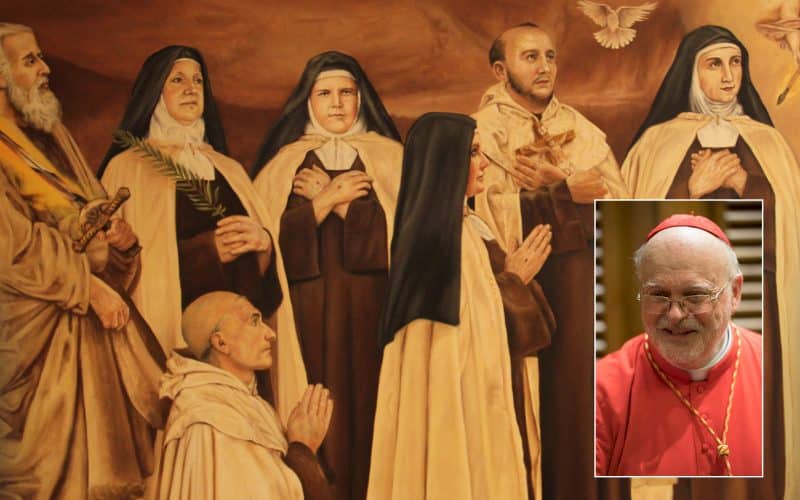Anders Cardinal Arborelius has established himself as a strong leader of Sweden’s Catholic minority
The Lumen Christi Institute is excited to welcome Anders Cardinal Arborelius, Sweden’s top-ranking Catholic prelate, to Chicago for two addresses on March 12 and 13. Arborelius’ visit will be an occasion for seeing old friends. He previously spoke at Lumen Christi programs in 2001 and 2005, and supported the founding, in 2001, of the Newman Institute, a Jesuit-run Catholic college domiciled in Uppsala University, Sweden’s oldest. The Newman Institute was in part inspired by the Lumen Christi Institute.
Born in 1949 in Switzerland to Swedish parents, Arborelius was raised Lutheran but always felt himself drawn toward the contemplative life. After a year-and-a-half long process of discernment, he was received into the Catholic Church at age 20.
Two years later, while intending to become a diocesan priest, Arborelius read Saint Thérèse of Lisieux’s autobiography The Story of a Soul. That book changed his life, and he decided to become a Discalced Carmelite, the contemplative religious order to which Thérèse had belonged.
He pursued studies in Lund, Brussels, and at the Carmelite college for studies in Rome, taking his final religious vows in 1977 and being ordained to the priesthood in 1979. Then he spent nearly twenty years living in a contemplative hermitage in southern Sweden, from which he would venture out to give talks and retreats. Until, that is, he received an extraordinary request.
In November of 1998, John Paul II appointed Arborelius the Bishop of Stockholm, Sweden’s single Catholic diocese that spans the country. Arborelius was the first ethnic Swede appointed to his homeland’s see since the Reformation, in part because Sweden has since then produced so few Catholic priests.
In his capacity as shepherd of Sweden’s roughly 115,000 Catholics—though he ventures that due to recent high immigration, especially from eastern Europe and the Middle East, that official number may be less than half the true one—Arborelius is charged with steering the Church in one of Europe’s most secular countries. According to some surveys, less than one third of Swedes describe themselves as religious, and even fewer participate regularly in liturgical services.
Twenty years after his appointment Arborelius received another singular summons. Last summer, Pope Francis elevated him to the cardinalate, making him the first cardinal in Sweden’s history, and also appointed him to the Pontifical Council for Promoting Christian Unity. The latter appointment signaled the Vatican’s recognition of Arborelius’ committed ministry amid Sweden’s highly ecumenical conditions: nearly 60 percent of Sweden’s population (of just under 10 million) are baptized Lutherans.
According to a transcript of a radio interview conducted by the Vatican shortly before this historic elevation, the cardinal-designate said of its significance:
It’s really a historical event and I think it’s typical of Pope Francis that he looks to those parts of the world that are far away … so he wants to encourage those minorities scattered all over the world and show that they are important in God’s eyes and in the eyes of the Church even if they are very small realities.
The man who had dwelt in contemplative silence for nearly twenty years had arrived. Sweden’s leading news magazine Fokus even named Arborelius “Swede of the Year” for 2017—the first time a Catholic prelate had received the honor.
One contemporary issue about which the newly minted cardinal has been vocal is the role of women in the life of the Church. This ever lively topic’s relevance was intensified when Pope Francis created a Commission of Study on the Diaconate of Women last August. The Commission consists of twelve members, half of them women, and is led by Cardinal Ladaria Ferrer, Prefect of the Congregation for the Doctrine of the Faith—a position that Joseph Ratzinger held for many years under John Paul II before becoming Pope Benedict XVI.
Asked about his thoughts on this subject in a June interview with the National Catholic Reporter, Arborelius reflected that “the role of women is very, very important in society, in economics, but in the Church sometimes we are a bit behind.”
Referencing Pope John Paul II’s practice of sometimes seeking counsel from Mother Theresa and Chiara Lubic, founder of the Focolare movement, Arborelius suggested that “maybe [this papal practice] could be made more official,” adding: “We have a College of Cardinals, but we could have a college of women who could give advice to the pope.”
The cardinal has been reflecting upon these issues for some time. In a 2001 interview, he said:
The promotion of responsibility for women in Church and society also is an important issue. Because there is no real longing for female priests among Catholics, we can concentrate upon the real possibilities for women.
Arborelius brings an important perspective to these considerations. He inhabits a religious tradition that has produced some of the Church’s most popular female saints and most influential thinkers and writers: the mystic and reformer Teresa of Ávila, the beloved Little Flower Thérèse herself, and Edith Stein (Teresa Benedicta of the Cross)—a brilliant philosopher who, although she did not receive the prestigious habilitation qualification (similar to a doctorate in the US) due to prejudice against her for being a woman, was commended by her mentor Edmund Husserl as being well capable of the highest level of research according to the standards of German universities.
Arborelius will draw upon the wisdom of these Carmelite figures and his own experience as a contemplative and prelate in delivering his two addresses.
On Monday evening, March 12, Arborelius will give a talk titled “Silence, Prayer, and Contemplation in a Secular Society” at the University Club of Chicago. An open bar and heavy hors d’oeuvres reception will begin at 5:30pm, and the cardinal will begin his remarks at 6:30pm. Registration is required. Tickets cost $75.
The following afternoon, at the University of Chicago’s Divinity School, he will give a free and public lecture titled “The Witness of Contemplative Women in the Heart of the Church” at 4:00pm.
